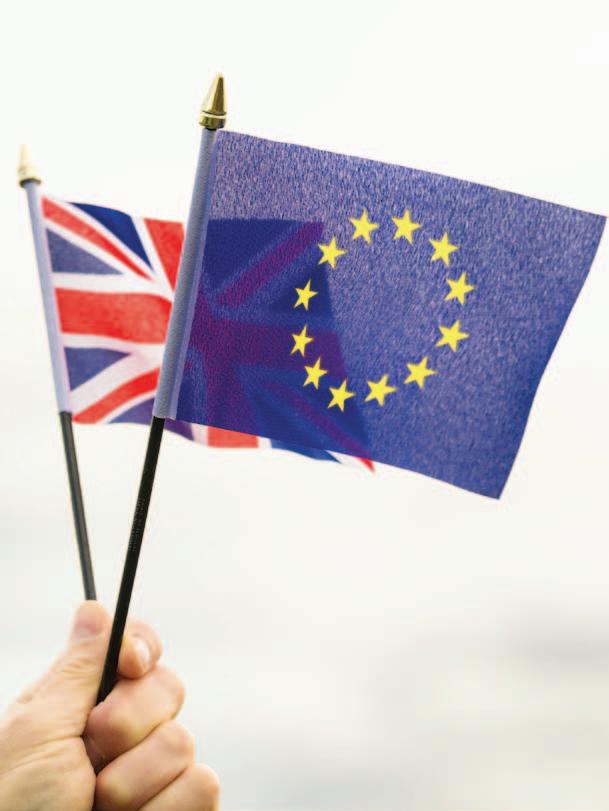
7 minute read
Love your country: some thoughts on patriotism, George Walker
Love your country: some thoughts on patriotism
George Walker joins a national debate
The ill-tempered argument about the United Kingdom’s future relationship with the European Union (EU) has brought an old fashioned word into the heart of the debate – patriotism. The British Prime Minister, David Cameron, described his ‘big, bold patriotic case’ for remaining within the EU while his cabinet colleague, the Justice Secretary Michael Gove, insisted that leaving the EU would be an ‘empowering moment of patriotic renewal’.
One definition of patriotism is ‘the emotional attachment to a nation which an individual recognises as their homeland’ and arguably the key word in this definition is emotional. It reminds us that while patriotism has rational roots in a shared history, culture and citizenship, there is also an irrational element comprising nostalgia and pride, and a dangerous element that appears when patriotism turns into nationalism.
Is patriotism a virtuous quality deserving of encouragement in programmes of education or does it remain, in Dr Johnson’s words, the last refuge of the scoundrel? Let us examine some examples of this controversial concept.
Love your country
The early morning tram to the International Baccalaureate office used to take me past the spot where Geneva’s most famous citizen, Jean-Jacques Rousseau, was born in 1712. A supermarket has replaced the original house, and written incongruously in large script on its shiny tiled façade are the words of advice given to Jean-Jacques by his father, Isaac: ‘Jean-Jacques, aime ton pays’. Rousseau’s ‘pays’ was the protestant republic of Geneva with a population scarcely equal to that of a small market town, and Isaac went on to describe the close human relationships that should underpin his son’s patriotism: ‘The Genevois are your friends and brothers; joy and harmony reigns in their midst. You are Genevois and you will meet other people, but even if you travel as much as I have you will never find their equals’.
Rousseau was proud to be a citizen of Geneva and so describes himself on the title page of his famous political treatise, The Social Contract. In 1762 he chose Geneva’s democratic governance as a practical model on which to build his theory of an appropriate relationship between the individual and the state. Rousseau wrote: ‘I feel happy whenever I meditate on governments, always to discover in my researches new reasons for loving that of my country.’
But his patriotism won him few friends. The Social Contract was deemed seditious, copies were burned in the streets of Geneva and he spent the last quarter of his life in exile, surrendering his precious Geneva citizenship.
Rousseau did love Geneva and he retained strong memories of that conversation with his father – ‘My father, embracing me, was shaking so much that I can still feel and share it today’ – but only in the sense that he loved what Geneva stood for. Rousseau was a loner with an awkward, unattractive personality who attached little importance to the ‘joy and harmony of friends and brothers’. Patriotism for him had little to do with the day-to-day association with his fellow citizens, but rather a sense of pride in a system of governance designed to protect their freedoms within the structure of a modern state. He never allowed the love of his country to weaken his criticism of what he often saw as its shortcomings.
Patriotism is not enough
As the process of globalization erodes the formal borders of nation states, so the object of one’s patriotic feelings can become harder to define. This is not a new problem. At 7 am on the morning of 12 October 1915 the British nurse Edith Cavell was executed by a German firing squad. Her ‘crime’ – which she had made no attempt to conceal during her court martial – was to help British and French soldiers escape from German-occupied Brussels, and she was found guilty of treason, an offence which carried the death penalty. On the eve of her execution she told a visiting Anglican chaplain ‘Patriotism is not enough. I must have no hatred or bitterness towards anyone’, words that are engraved on her memorial statue near Trafalgar Square in London. Her death provoked widespread revulsion and condemnation, especially in the United States. As she acquired the status of martyrdom, her execution proved to be a propaganda disaster for the German government.
Nurse Cavell was already working in Brussels when war was declared between Britain and Germany in August 1914. The hospital of which she was matron was taken over by the Red Cross, operating in German-occupied Belgium under the terms of the 1906 Geneva Convention. Cavell’s action in smuggling allied soldiers – around two hundred in total – back to the safety of the Netherlands contravened those terms. Cavell’s famous last words are a moving statement of a very brave nurse insisting there shall be no distinction between friend and foe in her hospital; each shall be treated according to his medical needs. What they do not describe, or attempt to justify, is her decision to flout the Geneva Convention by putting the immediate needs of her compatriots above the long-term protection guaranteed by the Red Cross. Patriotism was indeed not enough if it was to put at risk the work of an international organisation that was committed to protecting the basic human rights of all those who found themselves exposed on the battlefield.
Education for patriotism
In his book Schools Across Frontiers, Alec Peterson, founding director general of the International Baccalaureate, insists there need be no conflict between education for patriotism (as might be promoted by a national curriculum) and international education. On the one hand Peterson applauds the role of patriotism in offering ‘a countervailing force to the atomistic threats of isolation inherent in so much of modern life’ while, on the other, he draws our attention to the impact of mass migration and the growth of regionalism, often the birthplace of terrorism. Here, says Peterson, is a need for another countervailing force – international education, which is designed to foster international mindedness – to oppose the adverse forces of jingoism and nationalism that are sometimes encouraged by patriotic education.
Peterson called for ‘a more subtle and sophisticated form of education for patriotism’. A generation later we are in a better position to suggest a number of possible components of such an education. For example, educators should encourage their students to: 1. Feel comfortable with multiple loyalties, derived from a range of different affiliations, in order to avoid an obsessive concern with a single issue that can lead to extremism. 2. Understand how the use of social media can summon groups to register their (often short-term) loyalty to a person or to a cause. Flags and national anthems cannot compete with the persuasive power of the digital media. 3. Recognise that in some parts of the world loyalty to religious groups that cross territorial boundaries is more powerful than patriotism towards a particular country. 4. Reflect on the meaning of pride which is often associated with patriotism. Can one be proud of someone else’s achievements? Can we prevent wounded patriotic pride turning to destructive vengeance? 5. Understand the impact of globalisation on patriotism.
In or out?
How can two senior ministers of the same government, sitting around the same cabinet table, use the concept of patriotism to support diametrically opposed positions on Britain’s relationship with the EU?
Michael Gove’s position, contained in a speech on 19 April 2016, was almost Shakespearean in its emotional appeal: ‘For Britain, voting to leave will be a galvanising, liberating, empowering moment of patriotic renewal … We will have confirmed that we believe our best days lie ahead, that we believe our children can build a better future, that this country’s instincts and institutions, its people and its principles, are capable not just of making our society freer, fairer and richer but also once more of setting an inspirational example to the world.’
David Cameron, on the other hand, in a speech delivered on 9 May 2016, insisted that going it alone was not a realistic option. Britain’s greatness was best sustained through collaboration with others: ‘If you love this country, if you want to keep it strong in the world and keep our people safe, our membership of the EU is one of the tools – one of the tools – that helps us to do these things … We love this country and we want the best future for it.’
Using Rousseau’s phrase – love this country – Cameron argues that patriotism needs protection: pride in being British has to be understood in the context of the economic and political environment of the European Union.
On 23 June of the same year the British people voted narrowly, but decisively, in favour of leaving the EU. Time alone will judge the wisdom of that decision but, in the meantime, let us remember that 21st century patriotism comes with the label ‘handle with care’.










